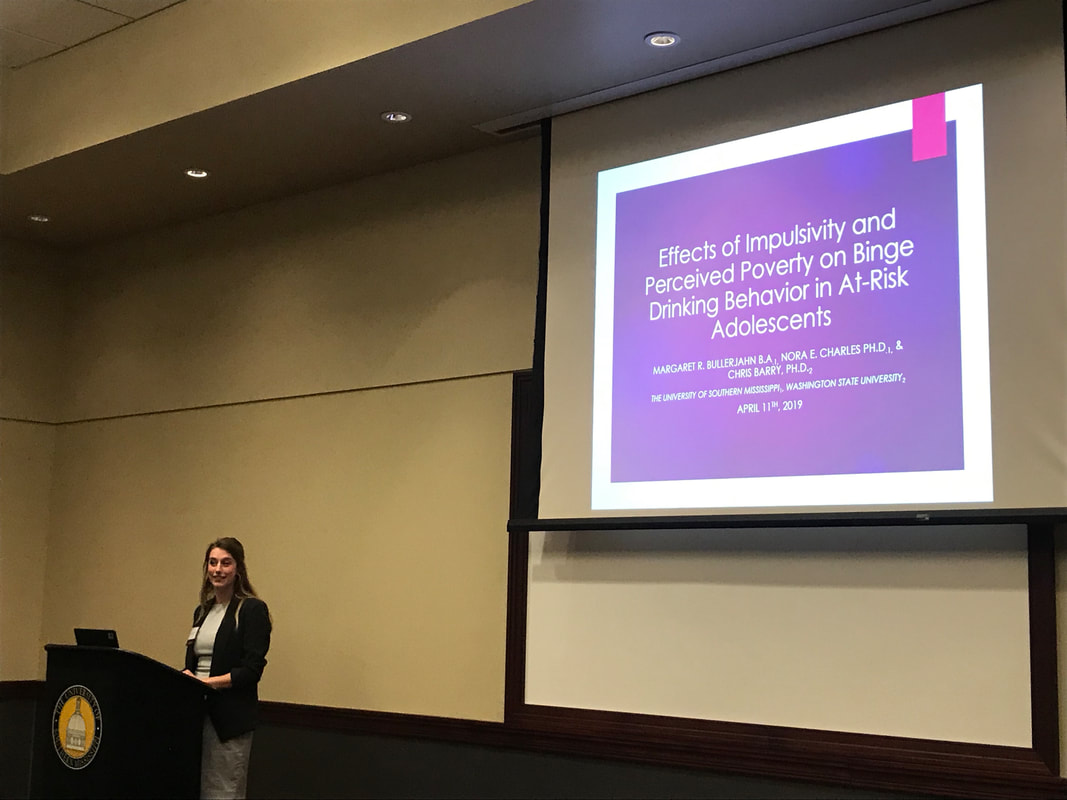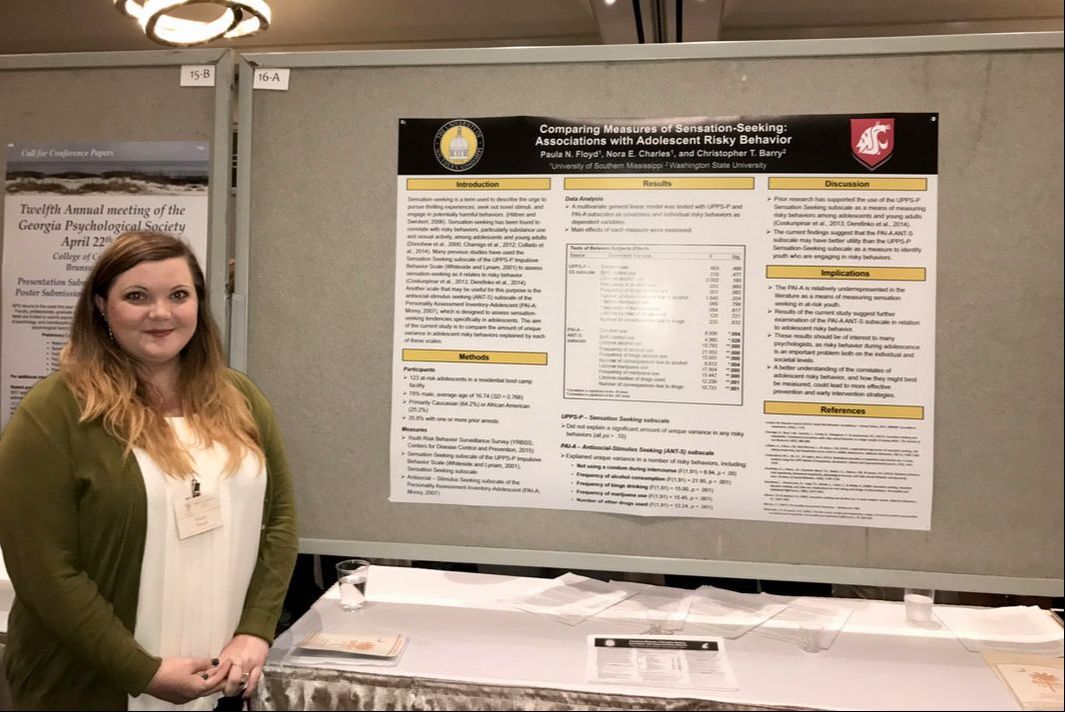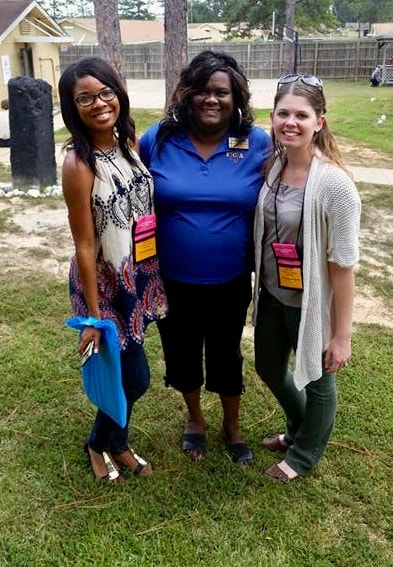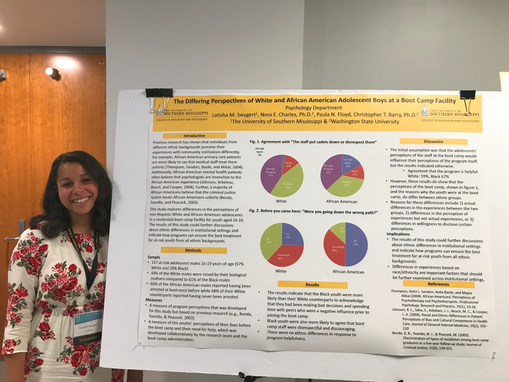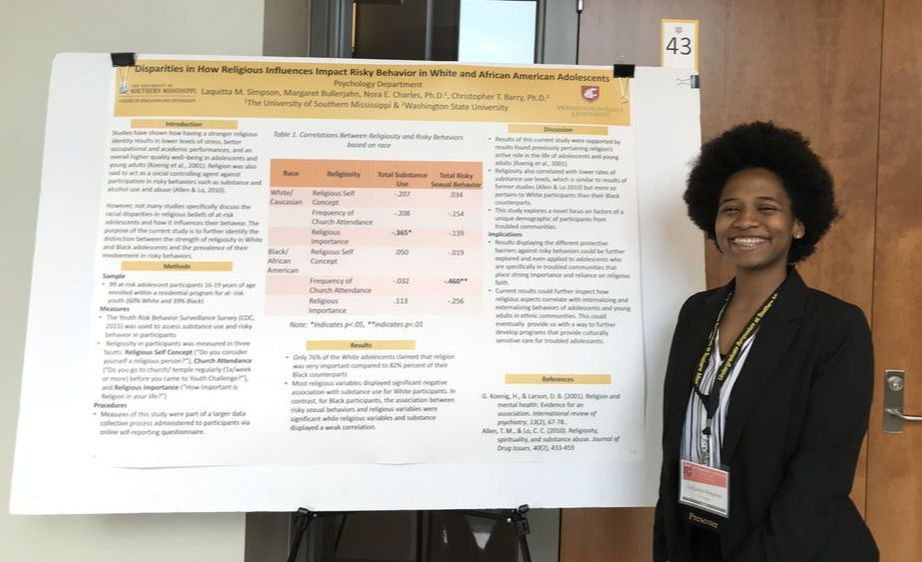current research
|
|

Project ACCESS
Project ACCESS is funded by the Health Resources and Services Administration of the U.S. federal government (#1 MC1HP42117‐01‐00). It is a 4-year, $699,788.00 training grant for Clinical Psychology PhD students and Masters in Social Work students that is led by Dr. Charles. Psychology faculty member Dr. Kristy McRaney and Dr. Cat Poehing from the MSW program are co-investigators on this project. All of MS outside of the Jackson area is a HRSA-defined Mental Health Professional Shortage Area and there is a need for more access to MH services for children and adolescents in our state, especially among marginalized populations. Each year, ACCESS will fund 3 Clinical Psychology students and 3 MSW students to work in 3 community settings that work with underserved youth and families: pediatric primary care, juvenile detention, and a child advocacy center for victims of abuse and neglect. ACCESS trainees gain experience implementing evidence-based services in interdisciplinary settings, clinical training related to assessment, trauma, and other presentations commonly seen through the project, and are able to contribute to the project's research aims. Our goals for this project are to understand the unmet behavioral healthcare needs in the community, increase access to high-quality behavioral healthcare, study the process of integrating behavioral healthcare into settings where it has not been offered or has been available on a limited basis, and to examine outcomes for families receiving our services. 
AWARE in Mississippi
AWARE in Mississippi is funded by the Substance Abuse and Mental Health Services Administration of the U.S. federal government (SM087489-01). It is a 4-year $7.2 million partnership between the MS Department of Education, the MS Achievement School District (MASD), MS Department of Mental Health, our state’s Federation of Families organization, community providers, and multiple programs across three MS universities (MSU, USM, UMMC). Psychology faculty member Dr. Stephanie Smith is PI and Dr. Charles is Co-PI of the USM component of this project. AWARE aims to increase mental health awareness, foster resilience, and strengthen access to trauma-informed, culturally responsive, and family driven mental health services and supports in under-resourced school districts in MS. Each year, 3 AWARE funds 3 Clinical Psychology PhD students to work on training school personnel, providing services, and monitoring the effectiveness of program implementation. AWARE focuses on developing and improving a school-based continuum of awareness, prevention, training, and service linkage and delivery. Key objectives include: implementing MH awareness programming; screening for MH, adverse childhood experiences, and suicidality; suicide prevention and postvention programs; violence prevention and postvention programs; disseminating a trauma-informed toolkit for school staff and parents; enhancing resiliency and MH well-being for all school-aged youth through implementation of a social emotional learning curriculum integrated into general curriculum and linked to school-wide implementation of trauma-informed principles; and improving a multi-tiered system of support via a robust suite of training and workforce capacity building activities to school staff and parents that provides MH promotion, prevention, and intervention services along a public health continuum to meet students’ needs. Improving Outcomes in Juvenile Justice
We have partnered with a local juvenile drug court (JDC) to evaluate the individual, family, and system-related factors that contribute to outcomes for juvenile offenders and this project is funded by the local government. JDC is a docket within the juvenile court that focuses on juvenile offenders who have problems with alcohol or other drugs. JDC courts maintain close oversight of each case through frequent status hearings with youth and their families, as well as close collaboration with team members from treatment programs, the justice system, social services, schools, and law enforcement. Our project involves evaluating youths and their families and tracking JDC-related outcomes (e.g., drug test results, new offenses, program completion). The overall goal of this project is to determine changes that could improve the rate of successful program completion for youths in JDC. One specific area of concern is how to better engage families to participate in the program and help their child be successful in JDC. Our work includes analyzing data from court records, frequent interaction with justice system personnel and the court, and one graduate student is assigned to provide psychological assessment and intervention services to justice-involved families under Dr. Charles' supervision as their funded placement each year. We will be studying the implementation and effectiveness of these services as we continue to work with the JDC. Impulsivity and Risky Behavior among At-risk Adolescents
We work with a military-style residential program that serves adolescents who have dropped out of school and are not employed. Because they have not finished high school and are also not working, these youths are at risk for developing problems with substance abuse, delinquency, and other negative outcomes. Many of them have already engaged in some of these behaviors. Our initial work with this program focused on learning about risky behaviors among these youths and relating these behaviors to characteristics like impulsivity and exposure to stressors. One of our early findings was that youths in the program report significant difficulties with emotion regulation and impulsivity, so we provided a Dialectical Behavior Therapy (DBT) skills training group for select groups of youths at the facility for two years. We have since discontinued the DBT program, which was supported in part by a Society for a Science of Clinical Psychology Varda Shoham Clinical Science Training Initiative grant and a Proposal Development Grant from USM's Vice President for Research, but we continue to collect self-report data from these youths and to gather information from their program files. Associations between Stress and Risky Behavior in College Students We are studying how exposure to stressors interacts with distress tolerance ability in the prediction of substance use and other risky behaviors in college students. Students come into the lab to complete a questionnaire, an interview, and a computer-based task. The questionnaires and computer task tell us about the students' characteristics, and the interview covers their exposure to stressful life events. Students are then invited back to the lab 6 months later for a follow-up. We are interested in learning what characteristics at time 1 are associated with risky behavior by time 2. We are also interested in cross-sectional associations between variables like impulsivity, distress tolerance, and psychological symptoms. This study will help us identify predictors and correlates of risky behaviors in college students, and might suggest appropriate interventions to prevent or reduce these problems. Diet and Substance Use in College Students
This study is a collaboration with Dr. Katherine Serafine's neuroscience lab at the University of Texas- El Paso. We are asking college students to complete a pre-test survey about their substance use, typical diet, and other factors. We then have them complete daily diaries about their diet and substance use. We are interested in seeing if certain dietary patterns are linked with substance use because there is non-human animal data suggesting that this may be the case. If we identify a pattern, Dr. Serafine will begin a study that aims to test the mechanism by which diet may influence substance use in non-human animals. Perceptions of Mental Health Services
We are interested in understanding how the public perceives mental health services, as this is critical for dissemination of psychological science and for getting services to the people who need them. To this end, we have examined perceptions and expectations about psychotherapy and therapists among non-treatment-seeking adults and we are currently collecting equivalent data from parents in an effort to better understand parent perceptions and how they might facilitate or limit children's access to care. |
